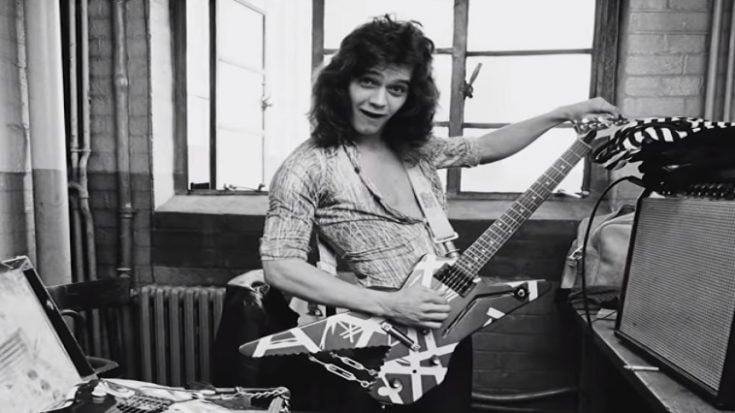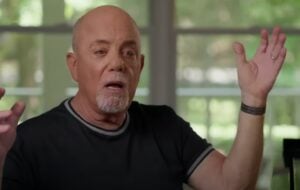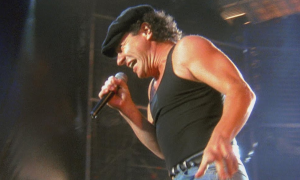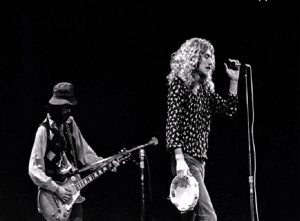The Tragedies In Eddie Van Halen’s Life

Eddie Van Halen Dies at 65 after cancer battle - CNN /YouTube
Eddie Van Halen’s name is synonymous with rock and roll royalty. His innovative guitar work and electrifying stage presence redefined the genre, leaving an indelible mark on music history. But what if we told you his story wasn’t just one of triumph?
Eddie’s life, while filled with musical achievements, was also marred by a series of tragedies, culminating in his untimely passing in 2020. This begs a crucial question: why did a man with so much to live for, a loving son by his side, and a legacy to protect, fail to take the steps necessary to prevent his own demise?
Let’s delve deeper into the heart-wrenching details surrounding Eddie Van Halen’s final chapter, uncovering the missed opportunities and unforeseen circumstances that led to the loss of a musical icon.
https://twitter.com/Joe_S_Pure/status/1750947683953471761
Rooted in Music, Shaped by Upheaval
Edward Van Halen’s story begins in the Netherlands, where he was born into a household brimming with music. His father, Jan Van Halen, was a skilled musician, playing clarinet, saxophone, and piano. This artistic influence would undoubtedly leave its mark on young Eddie. However, his early life wasn’t without its challenges.
The Van Halen family faced prejudice due to their mixed heritage. Eddie’s mother, Eugenia, was of Indonesian descent, and in the Netherlands of the 1950s, interracial relationships were often met with disapproval. Seeking a more tolerant environment, the Van Halens immigrated to the United States when Eddie was young. Settling in Pasadena, California, they found themselves surrounded by a new culture and a fresh start.
It was here that music truly took hold of Eddie and his brother Alex. The burgeoning rock scene of the 1960s, spearheaded by the Beatles and the British Invasion, captivated their imaginations. Inspired by these musical heroes, the brothers began taking piano lessons, showcasing a natural aptitude for music.
Eddie, in particular, displayed a remarkable ability to learn music by ear, a talent that would later fuel his innovative guitar playing. Despite the challenges of their early life, the seeds of Eddie Van Halen’s musical genius were sown in this period, nurtured by a supportive family and the electrifying energy of rock and roll.
From Backyard Jams to Van Halen
The embers of Van Halen began to glow in the early 1970s with the formation of a band called Mammoth. This Pasadena-based group housed the core of what would become a rock and roll phenomenon: Eddie Van Halen’s revolutionary guitar talent and his brother Alex’s thunderous drumming.
Fueled by a shared passion for music and an undeniable on-stage chemistry, they honed their craft through countless backyard jams and local gigs. Their sound was unlike anything heard before – a potent cocktail of Eddie’s electrifying technique, pushing the boundaries of rock guitar, and Alex’s powerful, rhythmic foundation.
The missing piece arrived with the flamboyant David Lee Roth. His theatrical stage presence and powerful vocals perfectly complemented the raw musical energy of the Van Halen brothers. With this lineup solidified, Van Halen (the name change reflecting the Dutch roots of the band) transformed from a local sensation into a force to be reckoned with.
Their live shows were explosive, captivating audiences with Eddie’s dazzling guitar pyrotechnics and Roth’s charismatic persona. It wasn’t long before their reputation caught the attention of Warner Bros. Records, setting the stage for a meteoric rise that would reshape the landscape of hard rock.
Commercial Triumph and Creative Tension
Van Halen’s self-titled debut album in 1978 was a sonic explosion. Eddie’s groundbreaking guitar work, with its innovative tapping and finger-picking techniques, redefined the instrument’s possibilities.
Combined with David Lee Roth’s electrifying vocals and the band’s infectious energy, the album became a runaway success, achieving multi-platinum status and propelling them to rock royalty. This initial triumph was followed by a string of platinum-selling albums like 1984 and Fair Warning, further solidifying their place at the forefront of hard rock.
However, beneath the surface of their meteoric rise, tensions began to simmer between Eddie and Diamond Dave. While Roth craved a more pop-oriented direction, with catchy hooks and radio-friendly anthems, Eddie remained fiercely dedicated to his musical innovation and exploration.
This clash in artistic vision created a growing rift within the band. Eddie, the mastermind behind their sound, yearned for a deeper musical exploration, while Roth prioritized the commercial success that came with a poppier approach. This fundamental difference in creative philosophy would ultimately prove to be the catalyst for a major shift in the band’s future.
A Revolving Door of Singers
The departure of Roth in 1985 marked a turning point for Van Halen. Eddie, determined to keep the band moving forward, embarked on a quest to find a new vocalist who could not only fill Roth’s flamboyant shoes but also complement his own musical evolution. This search led them to Sammy Hagar, a seasoned rock singer known for his powerful vocals and energetic stage presence.
The resulting collaboration, often referred to as the “Van Hagar” era, proved to be a surprising success. Their albums, like 5150 and OU812, achieved even greater commercial heights than the Roth era, with several No. 1 hits on the Billboard charts. Hagar’s bluesy swagger and Eddie’s continued instrumental experimentation created a heavier, more mature sound for the band.
However, despite the initial success, internal conflicts and substance abuse issues began to plague the band. The friction between Hagar and Eddie, fueled by differing musical tastes and personality clashes, ultimately led to Hagar’s departure in 1996. In a desperate attempt to recapture their magic, Van Halen cycled through various vocalists in the following years, including Gary Cherone, Mark Stanway, and Hagar’s brief return.
Sadly, none could replicate the chemistry and success of the Roth or Hagar eras. The constant lineup changes and a shift in musical trends seemed to diminish the band’s momentum, leaving fans with a sense of nostalgia for the glory days.
A Shadow Over Genius
Despite his undeniable talent and rockstar image, Eddie Van Halen’s life was not without its struggles. One of the most significant challenges he faced was a series of health issues that began in the early 1990s.
In a decision that would have long-term consequences, Eddie ignored the need for a hip replacement surgery. This neglect caused chronic pain and mobility problems, impacting his ability to perform and record at his peak.
Further complicating matters, Eddie was diagnosed with tongue cancer in 2000. This news came as a shock to fans and the music industry alike. Fortunately, Eddie underwent a successful surgery to remove part of his tongue. While he recovered physically, the experience undoubtedly served as a wake-up call.
However, despite the warnings and potential health risks, Eddie continued to smoke cigarettes, a habit that would contribute to his later struggles. These health battles cast a shadow over Eddie’s life, reminding him and his fans of the fragility of life and the importance of taking care of oneself.
Personal Struggles and Redemption
Eddie’s personal life mirrored the turbulent highs and lows of his musical career. Just as the band faced creative clashes and lineup changes, Eddie’s personal relationships experienced a period of turmoil.
His marriage to actress Valerie Bertinelli, which began in 1981 and brought them son Wolfgang, ultimately ended in divorce in 2007. The pressures of fame, combined with Eddie’s struggles with alcohol and substance abuse, contributed to the breakdown of their relationship.
However, amidst the chaos, a beacon of hope emerged in the form of his son Wolfgang. Seeing his father’s struggles with addiction, Wolfgang became a powerful motivator for change. Inspired by his son’s love and support, Eddie finally committed to sobriety in 2008. This decision marked a turning point in Eddie’s life, allowing him to focus on his health and rebuild his relationships.
He found renewed peace and companionship with his second wife, Janie Liszewski, whom he married in 2009. While his personal journey was not without its challenges, Eddie’s commitment to sobriety and the love of his family offered him a chance at a more fulfilling life.
Final Battles and Enduring Legacy
A cruel twist of fate awaited Eddie Van Halen in 2017. He received a devastating diagnosis of stage four lung cancer. This aggressive form of the disease presented a formidable challenge, and Eddie bravely embarked on a course of treatment.
However, the global pandemic that unfolded in 2020 added another layer of complexity. Restrictions and safety concerns limited his access to potentially life-saving treatments, hindering his fight against the relentless illness.
Sadly, Eddie’s health continued to deteriorate. In early October 2020, he was hospitalized with pneumonia, a serious lung infection. This complication further weakened his already compromised system. A stroke, a sudden blockage or rupture of blood flow to the brain, struck him while hospitalized.
The stroke left him unable to speak, robbing him of a vital means of communication in his final days. Surrounded by his loving family, including his son Wolfgang, Eddie Van Halen passed away peacefully on October 6, 2020.
Eddie’s Misconception
Adding a fascinating, yet ultimately dismissed notion to his story, Eddie believed his metal guitar pick caused his tongue cancer. This theory, likely a coping mechanism in the face of a terrifying illness, was refuted by medical professionals.
There’s no scientific evidence to support the idea that a pick could trigger cancer.
Despite this misconception, Eddie’s monumental contributions to music remain undeniable. His innovative techniques and genre-bending style continue to inspire countless guitarists.
As a driving force behind Van Halen, he left an indelible mark on rock and roll history. His influence will undoubtedly resonate and inspire generations of musicians to come.











